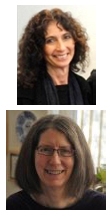Idie Benjamin and Dale Sides Cooperman
 Adults often refer to “please” and “thank you” as the magic words. They are the words we use as a “hook” to help children learn the importance of being polite. But these words really are magical. They are powerful words that can conjure a smile, get a person’s attention, connect us with others, and chase sad and angry feelings away.
Adults often refer to “please” and “thank you” as the magic words. They are the words we use as a “hook” to help children learn the importance of being polite. But these words really are magical. They are powerful words that can conjure a smile, get a person’s attention, connect us with others, and chase sad and angry feelings away.
Judaism elevates using these seemingly simple words into a holy act, a mitzvah. Each time a child demonstrates good manners, he/she is not just being nice but has had the opportunity to perform the mitzvah of Derekh Eretz. Derekh Eretz is old-fashioned civility. It is being polite, kind, considerate, and treating other people with respect.
Derekh means “a road.” Eretz means “the land.” When put together, the words Derekh Eretz take on a new and more compelling meaning – “the right way to go.” Derekh Eretz is the way a good person behaves.
Derekh Eretz teaches the power of positive words.
Derekh Eretz teaches us that words are powerful. They have the power to hurt or to magically heal.
Derekh Eretz shows that the simplest action can have the greatest effect. Good manners help us to see the humanity in each other. Our sages were wise indeed, because they considered Derekh Eretz as the foundation mitzvah for all the other mitzvot of gemilut hasadim – acts of loving kindness. If we cannot treat the people in our daily lives with respect and intention, why would we care about anyone else?
Good manners are the derekh, the way that we can create the kind of community in which we all want to live. Beginning simply with “please,” “thank you,” and “excuse me,” our children learn to recognize the effects of the mitzvot of gemilut hasadim and grow into adults who will one day address the larger problems of the world. It is our obligation to support this process.
Developmentally, young children are egotistical. They are at a stage where it is very difficult for them to understand another’s point of view, or to be aware that others have needs much like their own. “Unlike intelligence and physical attractiveness which depend largely on genetics, empathy is a skill that children learn. Its value is multifold. Children who are empathetic tend to do better in school, in social situations, and in their adult careers. Children and teenagers who have the greatest amount of skill at empathy are viewed as leaders by their peers.” (Dr. L. Kutner)
Judaism believes that the “way” to a better world begins with the simple words of kindness that we use in our everyday lives. We must teach children that good manners are always expected and that their actions can have a positive impact on others. It is our responsibility to model for them how we show respect for others and guide them in ways that are developmentally appropriate. Our goal is that with practice, children will emulate these positive behaviors, and they will become as natural to them as they are to you.
In the classroom, teachers give children directions all the time: time to line up, time to clean-up, blocks stay in the block area, etc. etc. A “please,” “thank you,” or “excuse me” must go with every interaction we have with children. Only then can teachers expect children to use these words. Once children are verbal, we can expect them to begin to use the ‘magic words.” It may seem silly to call them that. However, young children have a sense of the power of magic. Calling them “magic words,” shows that we know how powerful these words are.
Derekh Eretz moments are teachable moments. Many times each day situations will occur that are opportunities to support the teaching of this value/mitzvah. Practice does make perfect. When others demonstrate good manners to you, validate that person’s actions. When a child is kind, patient, or polite, thank him/her for having Derekh Eretz.
Derekh Eretz is the foundation. Unless we can say please and thank you with intention, we will not be able to care about people who are ill, hungry, homeless, or suffering. The impact of practicing basic civility is astounding – and the outcomes are profound. It is our responsibility as parents and teachers to help our children see that they have the power to be magicians and to make the world a better place. It starts with the magic words.
A resource
As educators of young children, we all know the power of music to teach and to reach the hearts of children. With an appreciative, “thank you,” to our colleague Judy Caplan Ginsburgh, we are honored to share her song, Derekh Eretz, which you can find on Amazing Songs For Amazing Jewish Kids at www.judymusic.com.

